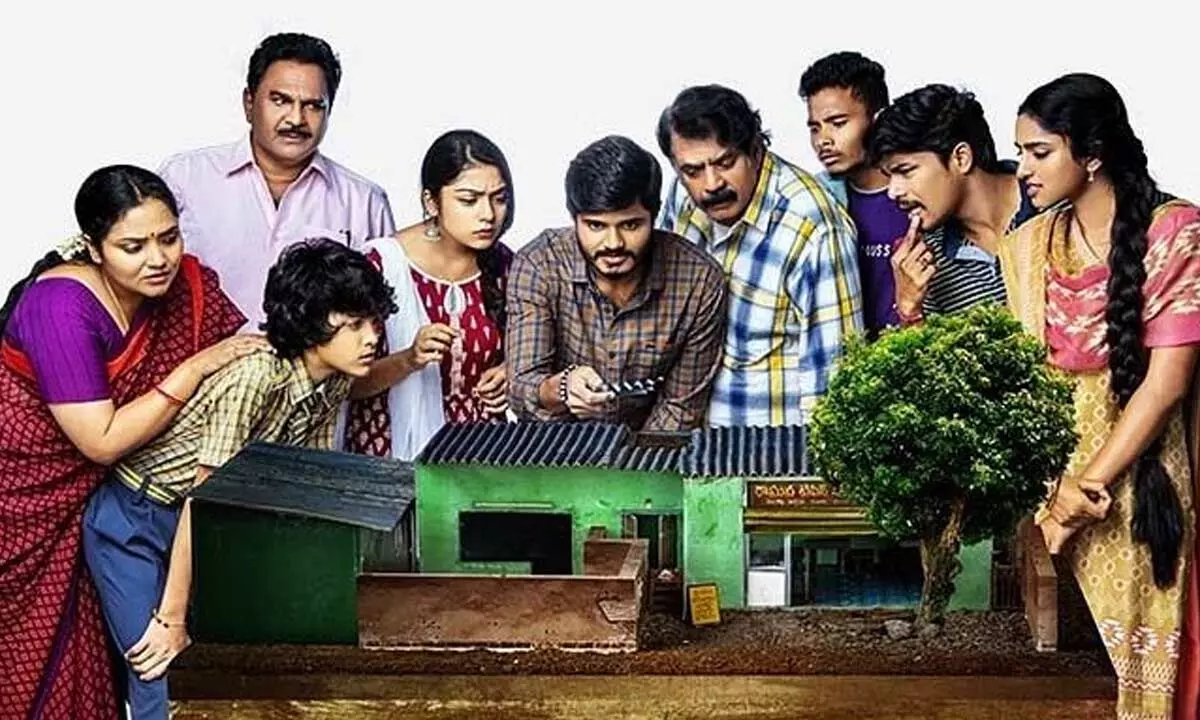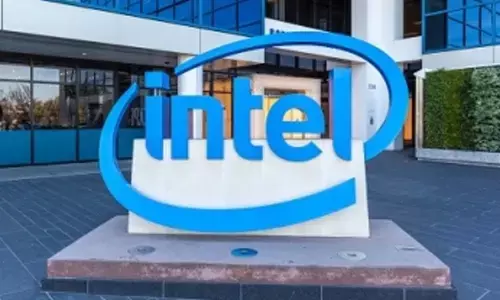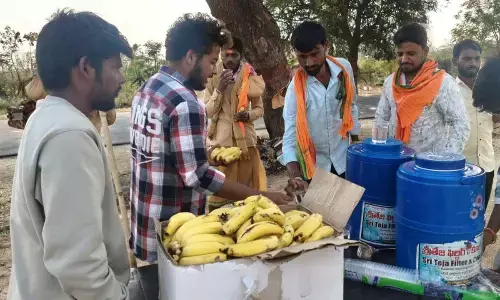Parties pay lip service, do little for middle class

Since First General Elections held in 1951-52, when elections to most state legislatures also took place simultaneously, many governments, both at the Center and in the States representing national and regional parties, ruled ‘India, that is Bharat
Since First General Elections held in 1951-52, when elections to most state legislatures also took place simultaneously, many governments, both at the Center and in the States representing national and regional parties, ruled ‘India, that is Bharat.’ These governments at times included coalition of either pre-poll or post-poll alliances, with namesake common minimum programme and with no profound ideology. Voters were swayed and misled with impracticable and unattainable promises by the parties in their manifestos, barring a few, and blindly believing them, they were voted to power, often, successively for more than one term.
Obviously, this is the beauty of the ‘largest parliamentary democracy,’ that is India. However, lately, conscious voters are choosy and demanding in their choice of preference, in critically assessing poll promises, and electing their representatives. They are no more taken for granted!
The Modi government recently constituted a committee, unpredictably and with no such precedent, headed by former President Ram Nath Kovind, to explore the possibility of ‘One Nation, One Election,’ ahead of a Special Session of Parliament from September 18 to 22. Assembly polls are due in five states in November-December 2023, followed by Lok Sabha elections in May-June 2024. The possibility of combining general elections and 9-12 state polls, which are scheduled either before or after Lok Sabha Elections, that includes Telangana, cannot be ruled out, as it appears now, notwithstanding merits, demerits, and vociferous objections from opposition parties in doing so. Political analysts view this as Modi’s master stroke plan of ‘One Nation, One Election’ of holding simultaneous elections for Lok Sabha and State Assemblies across the country.
Meanwhile, amid uproar over this, Chief Election Commissioner (CEC) Rajiv Kumar said in Bhopal that the Election Commission is ready to hold polls as per legal provisions that mandate it to do so. Rajiv Kumar said the commission’s duty is to hold elections before the term as per the constitutional provisions and the Representation of the People Act, which also authorises to hold them 6 months earlier. This holds good for State Assemblies also, said the CEC. This reiterates possibility of holding elections at the earliest, for which one needs to wait for announcement of modalities.
Either way, the process of drafting manifestos by the political parties will commence. Any scientific need analysis, even by the recently sprouting and apparent political strategists, has not been done as to what exactly to be included in the manifesto. The moral system founded by English philosopher Jeremy Bentham and encapsulated in the principle of 'The Greatest Good for the Greatest Number' was seldom adhered to. These ‘Cut and Paste’ self-styled strategists, comprising a highly paid team, posing themselves as professionals and intellectuals, without having even basic knowledge of pulse of voter, geographical area, historical and current background of the state, for which they draft ‘Political Strategy,’ often mislead even the best of the experienced and saucerful political bigwigs. Harsh reality is success in elections is not based on their advice, but hundred per cent to the credit of leader who led his or her party to victory.
Despite 75 years of Independence, daily essential needs of the middle class, not to speak of even BPL families, are hardly met. What people by and large, and middle class in particular, need is a ‘Safety Net’ of meeting their requirements of minimum essential commodities, in an ‘Accessible, Affordable, and Acceptable’ way. No concerted effort was made to include this aspect in poll manifestoes. Some political parties like BRS, however, presented the ‘Best of the Manifestoes’ of its kind, with umpteen welfare and development schemes, and besides implementing them, gone beyond implementing extra schemes, not included in Manifesto, a rare exception. This credibility among voters enabled it to win elections successively. The case with other parties, is the other way round, who just end up making false promises in manifestoes and still win elections. A Dichotomy! And that is Indian Politics and Democracy!
The question is what could be the basic minimum needs of middle class in the changed and ever-changing socio-economic scenario and how to make these needs available and accessible in a manner acceptable to majority. Some of these may sound funny, trivial, and even ridiculous, but they form part of daily life as minimum essential commodities, without which living becomes difficult, and which are highly expensive and not beyond reach of a common man, particularly the lower middle class, middle class and upper middle-class public, whose percentage is more than 60 according to rough estimates.
For instance, beginning with the day, the toothbrush and paste even of an ordinary quality is expensive and not affordable. For having a cup of coffee or tea, cost of milk and coffee or tea powder is expensive and not affordable. Raw material to make any item for breakfast is very expensive and not affordable. Rice, wheat, eggs, vegetables, oil, ghee, and every other ingredient required for lunch or dinner is very expensive and not affordable. For a change if anyone prefers to go to even an ordinary hotel, it is more expensive and not affordable.
Drinking water, coconut oil, soap, handwash, gas cylinder, lifesaving medicines, etc., are highly expensive and not affordable. Expenditure on education and health is exorbitant. The list is inexhaustive and these are the ‘essential needs’ to be included in the manifesto to provide them easily accessible and available at affordable prices in at government run fair price shops. This would go a long way in benefiting the middle class and also the BPL. By and large, in addition to these, every need connected to health, education, food, shelter, and clothing etc. of middle class is equally important and to be essentially prioritized in manifestos.
For generations, the Indian middle class, a catalyst in the society, fashioned and nurtured by Colonial British Raj, remained as a holy, sacred, and ill-fed cow! Manifestos since first general elections never gave priority to the middle class. Welfare measures for poor and BPL families and number of sops through financial institutions to rich was later development. Political parties, leaders, civil society organizations and even courts stand for marginalised people safeguarding their interests. Rich corporates are also taken care of because of their wealth. But none voice for the middle class and there is none to speak or plead on behalf of them barring for voting!
The biggest problem for the middle class since ages has been the limbo in which they are stuck forever. They are neither rich nor poor. They do not have access to subsidies that poor get. They do not have adequate income to meet their daily basic minimum needs. Middle class pays most tax, and yet, are the ones that receive least amount of benefits. They have to put in large hours of work so that they can give their family comparatively a good life. Their social status too has been static for centuries.
Manifestoes of most parties, by a striking coincidence, advocate prosperous economy, better deal for young and old people, unemployed youth, farmers, women, and in a nutshell, equal opportunities for all etc. but, in letter and spirit do not cater to the middle class. This is contrary to principle of equal opportunity, equitable distribution of wealth, basic economic, social insurance, and social security to all citizens, adversely affecting 60% and above middle class. Election manifesto, a written platform, assertive design, plan, strategy, approach, and philosophy of a political party, outlining its aims, objectives, ideology, intentions, views, policies, programs etc., shall reflect the interests of middle class as an ‘Essentially High Precedence.’ Hence, in poll manifestos in future, middle class welfare needs to be essentially prioritised.
(The writer is Chief Public Relations Officer to Chief Minister, Telangana)










